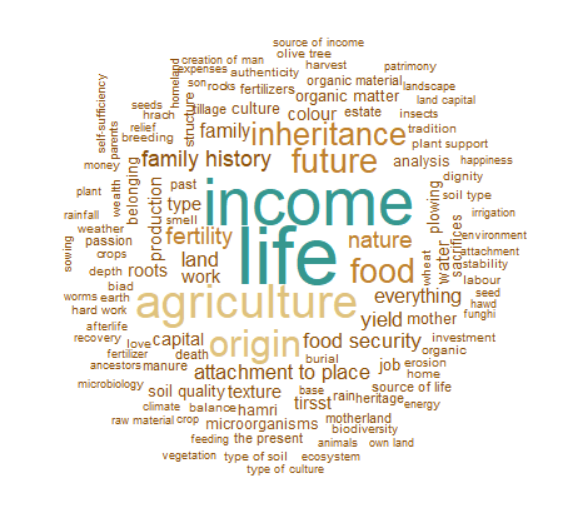
What is soil in the eyes of farmers?
Farmer surveys and Q-study underway
The past six months have been a busy time for the teams conducting the farmer surveys and Q-study. Across Morocco, Spain and Tunisia, our teams have contacted more than 500 farmers to survey their relationship to soil, their farming practices and sociocultural factors. The data collected will help to build a picture of how farmers across the Mediterranean perceive and relate to soil, and how sociocultural factors may be related to farming and soil protection. Farmers have expressed keen interest and engagement in the topic, and have been open to sharing their thoughts and experiences.
Socio-cultural perspective on soil
In the survey, we employed the freelisting technique to capture meanings that farmers associate with a particular landscape feature, in this case, ‘soil’. It appears that the terms “agriculture”, “income”, “life” and “origin” are frequently associated with the concept of soil among all respondents (Fig. 2). When we compare the frequencies of words mentioned by respondents in all three countries, we can see that some concepts are found more in one dataset than the others. For example, “fertility”, “organic” and “biodiversity” are mentioned more by respondents in Spain than in Morocco. While some terms are more associated with livelihoods, other terms are more related to the intrinsic quality of the soil. Some concepts go beyond agriculture and farming to other aspects of human life, including cultural aspects such as family, history and heritage.
Figure 1. Moroccan farmer and ConServeTerra staff member talking to each other.
Figure 2. Wordcloud showing terms that farmers associate with “soil”. The larger the terms the more often they were mentioned by the respondents of the survey.
Using photographs of farming to reveal how farmers perceive soil
In addition to the surveys, data collection for the Q-study has also taken place in Spain and Morocco (Fig 3). This method involves ranking photos of different farming practices and allows for interpretation and discussion of landscape preferences. The exercise has been a chance for researchers to engage farmers with visual stimuli, and many participating farmers have reported enjoyment of the process. Some farmers were keen to show us their own photos of similar practices on their own farms, further demonstrating their preferences for land management.
Figure 3. ConServeTerra team conducting Q-sorts with farmers in Oud Zem (left) and Khourigba (right), Morocco, October 2021. Photos: E. Topp
Data collection in Spain
In Spain, data collection has taken place at the Gallecs Consortium in Catalonia, where farmers have been invited to attend training sessions on topics such as composting and legume cultivation (Fig 4). Survey collection is currently ongoing and the next Q-sorts with farmers in and around the Gallecs region will take place on February 15th. Q-sorts are also being planned in Tunisia and Morocco.
Figure 4. Farming landscapes of Gallecs, Catalonia, Spain (left) and farmers attending a composting workshop at the Gallecs park centre on 30.11.2021 (right). Photos: E. Topp
For more information, please contact Emmeline Topp topp@uni-kassel.de







